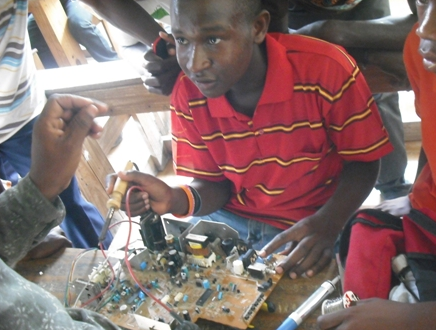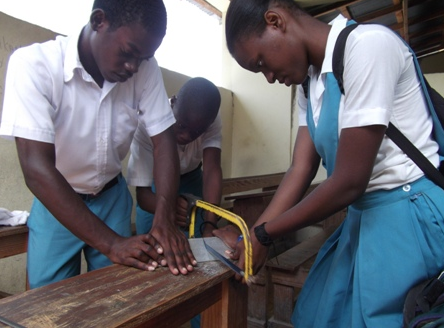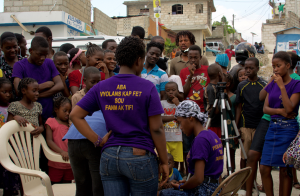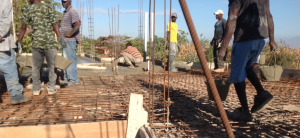By: Ryan Sawatzky
Originally Posted, June 2012
SOPUDEP director Rea Dol was presented a unique opportunity just a few months ago, when a generous amount of funds were directed her way from Rotary Barrie, in Ontario Canada. While SOPUDEP has implemented programs in free and accessible education for both adults and children and economic empowerment through micro-credit, Rea and her peers saw a need which they had not yet met: that of trade skills training. They decided the street children program would be the starting point, and those most in need were the attending youth in their late teens and early twenties.
As some may know, the street kids education program that Rea Dol started in 2009, has transformed a number of rough and tumble kids into young people who now take pride in their lives. What started as six kids, now has grown to over 150, ranging in age from five to their early twenties. Along with learning their ABC’s, these trade skills are now providing alternative ways to find employment.
The first street kids trade skills project would seek to tap into the ever expanding eco technology market, through providing these youth with theoretical and practical skills in electronics and a way to produce clean energy. They are building inverters for solar panels, which is the part of the photovoltaic system between the solar panel and the appliance or outlet that converts solar energy into usable household electricity. If anyone has ever made the trek to Haiti, one knows that electricity is a scarce and valuable commodity. What little hydro power there is, it is extremely unreliable.
Clean affordable power is then a step in the right direction for an impoverished country such as Haiti, if not for the rest of us. Providing skills to meet the coming demands for this technology is securing a position that many will not have. And while some would see this as a way to finding factory work, in Haiti, little employment is found without an entrepreneurial spirit.
The majority of employment in Haiti, as throughout the third-world, is through means of self-employment either at the market or through odd jobs. Factory work does very little for the economic stability of the population. Yet, the times are changing and education is becoming more prevalent in securing ones ability to even generate income for an independent business. Roadside tailoring and selling food are traditional business in Haiti, but coupling a trade with formal education will leave the person less vulnerable to opportunistic sharks and a way to gain credibility with financiers.
Literacy and basic math skills are mandatory due to advancements in technology and increased accountability in doing business. Western society provides necessary social programs which give its citizen’s a leg up to achieve a certain level of education and financial gains. But how does this translate to a country such as Haiti, where even receiving a basic education is well out of reach for the majority of the population?
To see the difference, you have to look at what were the causes of the “third-world”. This great divide of the rich, reasonably wealthy and the extremely poor was established in a global manner after the end of slavery and the decolonization of many countries. It was, and remains based on a residual master / servant system. The African slave trade was the backbone of North America’s and Europe’s ability to produce unprecedented means of wealth. With this, they were able to explore even greater means to financial gains and develop social benefits for its own citizen’s. However, those newly independent non western nations, that were asking for a new identity apart from their former colonial masters, were left to fend for themselves within the confines of an power system that did not recognize them as people worthy to take an equal part in thier economy.
Haiti was certainly no exception, becoming an independent nation in 1804, when the tide of racism and slavery in North America and Europe was still cresting. Haiti would also be an example to be made of for their disobedience and were left on the line to flounder as a nation with no finances (having being forced to to pay reparations of lost property and revenues to France.
If slavery, in its literal form was to become passé or economically unsound, the upper crust of western society would continue to call the shots in a “global economy”, while the third-world, with no real means or support, would have to do the best they could to follow suit or be indebted their former masters. These countries would now have to sell off national assets, give up natural resources, open their doors to western imports and industrialists, and provide a cheap labour force to make good on “generous loans” provided by imperial nations. In essence, the powerful were simply taking back what they deemed to be theirs in the first place.
With a look at history from this perspective, it is easy to see why the third world currently suffers the way it does. These countries are now locked into deep, deep debt through contracts from the World Bank and the IMF, that only really seek to incur massive amounts of interest with no substantial money being provided for these countries benefit. At least not for the majority of citizen’s living in chronic poverty.
This is the legacy organizations such as SOPUDEP has been left to deal with. They are having to evolve to find ways to empower their fellow citizen’s, preserve and rebuild culture, natural resources, and yet keep up with modern times. The current generations in Haiti are starting to put the fragments of a broken history together the best they can to make a new way forward.
The world is still transitioning out of an old system built on inequality and the concerned citizen or social group is almost essential at this moment to achieve social change. Success comes from the support given to groups that are striving for social balance in the world. SOPUDEP is doing the best they can to provide their fellow citizens a way to a better future.
As support grows, it is only natural that SOPUDEP would increase the skills to be provided. However, their initial step into the eco technology world is one in with foresight and potential.



![SOPUDEP visit to Despagne [Grand Anse] & Maillou [Les Cayes]](https://www.sopudep.org/wp-content/uploads/2019/06/Screen-Shot-2019-06-28-at-10.45.21-PM-166x300.png)
